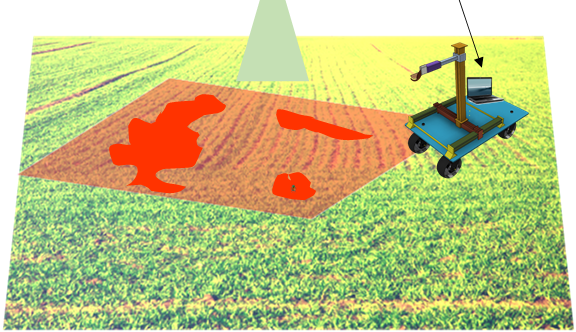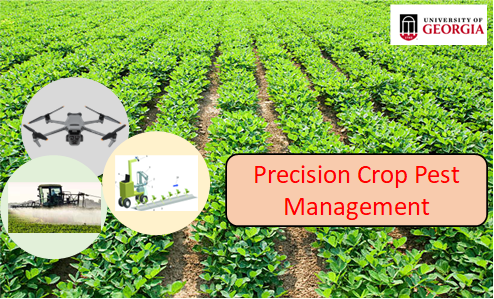Teaming for Interdisciplinary Research Pre-Seed Program
Advancing Precision Crop Pest Management Strategies for Sustainable Agriculture

Advancing Precision Crop Pest Management Strategies for Sustainable Agriculture

This proposal aims to establish a highly proficient and innovative team to advance the field of crop disease and pest management. A multidisciplinary team comprises agriculture engineers, plant pathologist, entomologist, nematologist, and weed scientist. The team will work collaboratively to develop external grant proposals for innovating cutting-edge technologies to effectively manage diseases and pests in agricultural fields and minimize their impact on crop yield. Engineering expertise will be focused on leveraging advanced technologies and data-driven strategies to reduce the use of agrochemicals and maximize their effectiveness. Engineers (Drs. Mahmud, Rains and Lu) will work on developing automated systems for pest detection, precise agrochemical applications, and data-driven decision-making. Input and feedback from the pathologist, entomologist, nematologist, and weed scientist will be integrated into the engineering activities. The pathologist (Dr. Oliver) will provide knowledge of plant disease causing pathogens and the cultural practices utilized for their management. Dr. Oliver will also contribute to diagnosing and understanding pathogen behavior, life cycles, and infection mechanisms. The entomologist (Dr. Sial) will enhance pest management by identifying pests, studying their behavior, and setting population thresholds for management interventions. The nematologist (Dr. Chowdhury) will contribute to pest management by studying nematodes, microscopic worms that can be plant pests or biocontrol agents. Dr. Chowdhury will provide expertise in nematode identification, behavior, and biology, adding to the development of targeted and environmentally friendly pest control strategies. The weed scientist (Dr. Basinger) will provide knowledge regarding weed species, growth patterns, and vulnerabilities. This knowledge will establish a foundation for weed control, optimizing resource use, and minimizing impact on crop production. All team members will interact among themselves to develop, execute, and reassess transdisciplinary plans, approaches, and activities for precision pest management in agriculture through a systems approach. The combination of expertise will guide the development of precise and targeted strategies to protect crops, ensuring efficient and environmentally responsible pest management in agriculture and contributing to global food security and ecological balance.
The team requests funds to perform essential activities to generate ideas and concepts for developing groundbreaking research projects on precision pest management. These activities include group discussions and meetings, grower farm visits, attending regional conferences and participating in workshops and field demonstrations/trips. Team members are located at two different campuses (Athens and Tifton). Thus, travel expenses will be needed for in-person meetings and discussions. Through such activities, team members will learn in-depth about crop production systems, identify potential grower problems and challenges, and provide insights to solve those problems related to pest management.
The output of the team activities will help the team develop ideas for multiple transdisciplinary projects such as smart crop disease prediction and management systems, AI-enabled insect/pest surveillance solutions, robotic laser-guided targeted weed management, etc., which are of interest to many federal funding agencies. The major funding agencies include the National Science Foundation (NSF) and the United States Department of Agriculture (USDA). The target programs with NSF include Cyber-Physical Systems (CPS). The CPS program accepts proposals throughout the year up to $1.2 million. CPS programs support research on engineered systems with seamless integration of cyber and physical components, such as computation, control, networking, learning, autonomy, security, privacy, and verification. The target program at the USDA includes Agriculture and Food Research Initiative (AFRI-FAS), which supports research in various cross-cutting domains. The last solicitation emphasized the importance of Agricultural Biosecurity as a priority area: “Detection, diagnostics, surveillance, and/or forecasting of transboundary, emerging, or re-emerging pests and diseases associated with plant production systems”. We anticipate that the emphasis on disease surveillance will only become more prevalent in the following years. Many other potential funding opportunities can be pursued by leveraging this idea, such as FFAR, Crop Protection and Pest Management (CPPM) and Southern SARE.
Relation to the Institute for Integrative Precision Agriculture:
The project on precision pest management is closely linked to the Institute for Integrative Precision Agriculture (IIPA) at the University of Georgia, as it focuses on developing advanced technologies and data analytics to manage and mitigate disease and pest-related issues effectively. The IIPA plays a pivotal role in researching, developing, and implementing precision agriculture practices, which involve various aspects of agriculture, including pest management. By implementing cutting-edge technologies, such as computer vision, artificial intelligence, robotics, data analysis and targeted application of pesticides, the project aligns with the IIPA’s mission to optimize agricultural processes, increase productivity, and reduce environmental impact through precise and data-driven approaches in agriculture, ultimately enhancing sustainable crop production practices.
Team Lead
Md Sultan Mahmud
mm44779@uga.edu
College: College of Agricultural & Environmental Sciences Department: Plant Pathology
Team Members
Glen Rains
College: College of Agricultural & Environmental Sciences
Department: Entomology
Guoyu Lu
College: College of Engineering
Department: ECE
Ashfaq Sial
College: College of Agricultural & Environmental Sciences
Department: Entomology
Jonathan Oliver
College: College of Agricultural & Environmental Sciences
Department: Plant Pathology
Intiaz Chowdhury
College: College of Agricultural & Environmental Sciences
Department: Entomology
Nicholas Basinger
College: College of Agricultural & Environmental Sciences
Department: Crop & Soil Sciences
